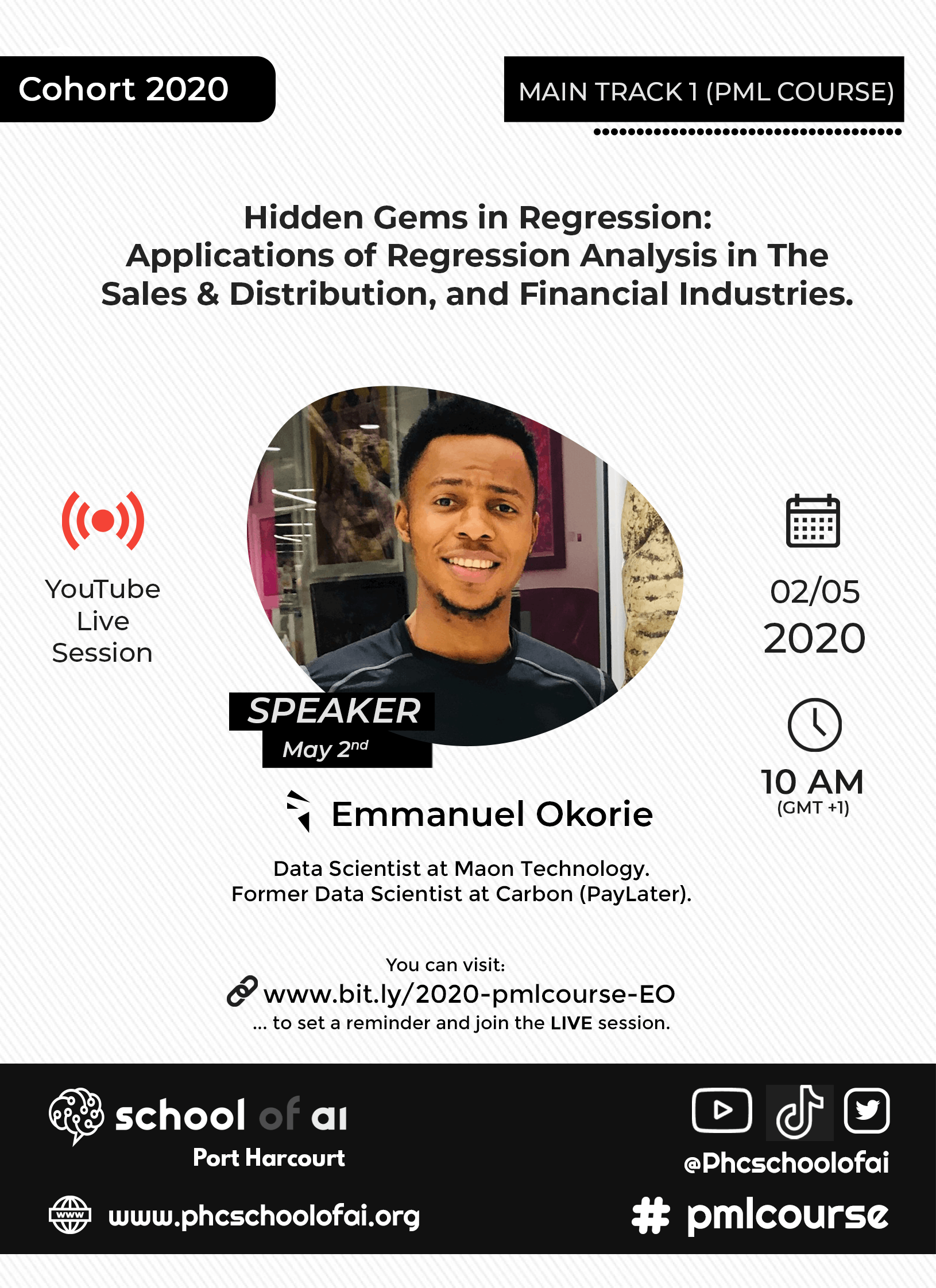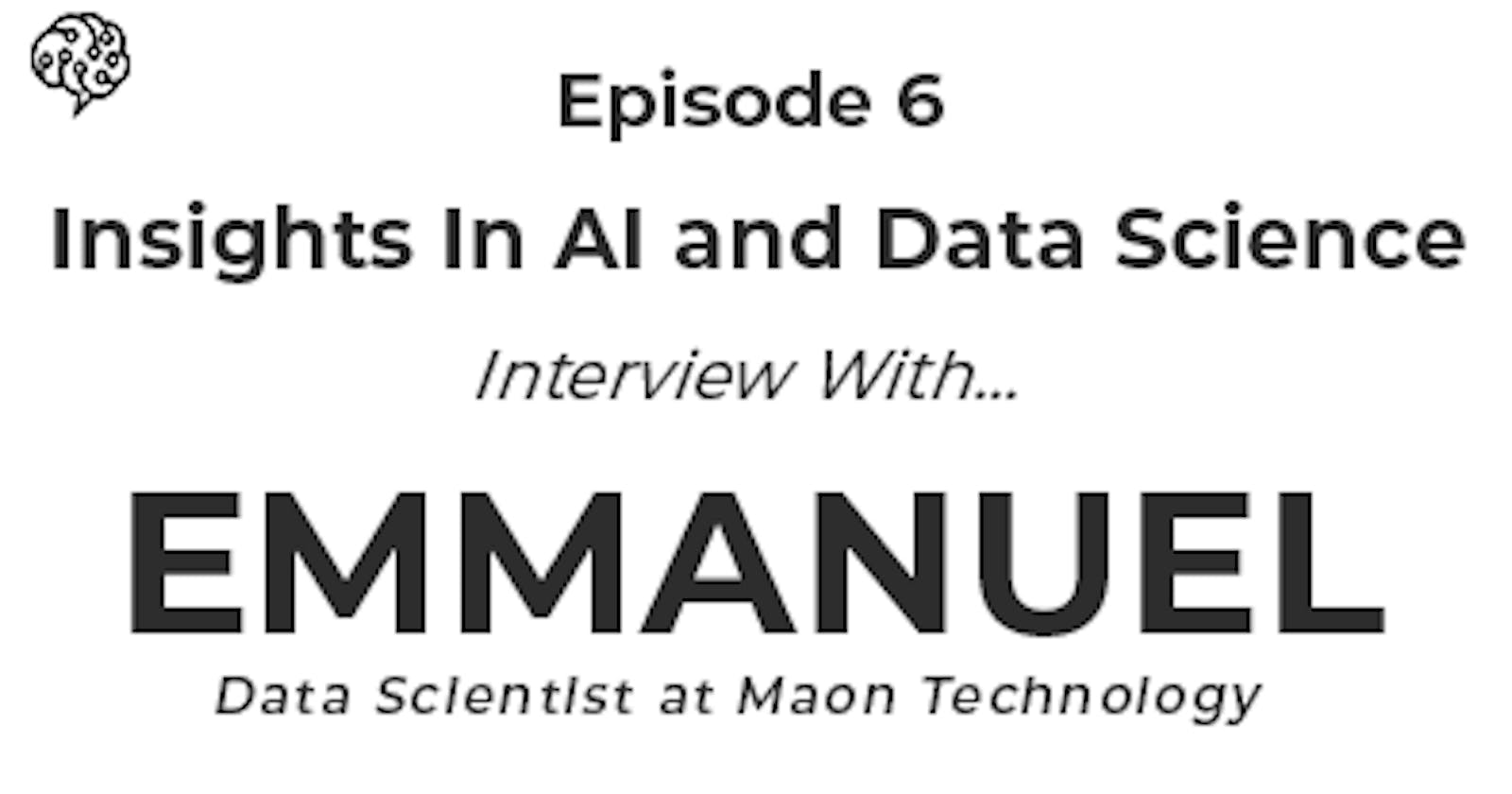Insights In AI and Data Science (Episode 6): Q and A with Emmanuel Okorie, Data Scientist at Maon Technology, and Formerly at Carbon (PayLater).

🕔Read Time: ~7 minutes
Hello, community!
We understand these are trying times the world-over but we hope you and yours are staying safe from the virus. Remember to follow recommendations from recognized health authorities in your region and help stop the spread of the virus.
We are back to our "Insights In AI and Data Science Q 'n' A With Our Experts" blog-post series. You can check the previous episode in this series on following good methodologies with Aurélien Géron (former YouTube product manager and author of a best-selling Machine Learning book on Amazon) by clicking here.
These "Q 'n' A" episodes will help you get to know various practitioners and experts in the field of Artificial Intelligence and Data Science at a personal and career level; these are mostly non-technical, insightful and fun conversations.
Check the table of contents below to quickly jump to a section in the article.
Table of Contents
You can learn from Emmanuel's workshop on Applied Regression Analysis In Sales and Distribution, and Finance Industries with the Port Harcourt School of AI. You should follow our Twitter page and subscribe to our YouTube channel to watch other insightful expert-led sessions both nationally and globally.
Who is The Interviewee For This Episode?
In this episode, our interviewee is one of the guest facilitators for the Practical Machine Learning course from the Port Harcourt School of AI.
This interview will give you an insight into the mind of Emmanuel Okorie. Emmanuel is a Data Scientist at Maon Technology , a sales and distribution company the Lagos city of Nigeria. Before that he worked as a Data Scientist at Carbon (formerly known as PayLater). He also takes on remote Machine Learning-related roles from time-to-time. He is an experienced enterprise Data Scientist and Machine Learning Engineer.
Emmanuel shares insights on his life and early career engagements, the qualities of a competent Machine Learning Engineer and Data Scientist, and how he overcame challenges he has faced as an ML Engineer. You will find a lot of useful and inspiring tips in this interview.
What You Will Learn From This Interview?
How Emmanuel started a career and the challenges he faced, including how he overcame them.
How to develop your Data Science job-search and interview-preparation strategies.
Why you should start utilizing the "small data" you have now to gain insights.
Qualities you should have to be a very good Data Scientist or Machine Learning Engineer.
How Machine Learning can improve sectors in Nigeria and what to take advantage of in the process.
Main Points We Got From The Article

Here are the main points we got from this episode with Emmanuel;
Small businesses or organizations do not necessarily need big data to leverage Data Science.
Communicating properly to stakeholders is perhaps the most important non-technical skill you should possess as a (Machine Learning) ML Engineer.
Proper understanding of an organization's challenges and a focus on the job descriptions required can help bolster your chances of landing an AI or Data Science job.
Interview Section With Emmanuel Okorie
Personal Questions (Get to Know Emmanuel)
Stephen: Hi there, Emmanuel. Welcome! We are glad you are doing this Q ’n’ A session with us — we are more than honored to have you come on-board with this and contribute to our community. Please, can you introduce yourself?
Emmanuel: My name is Okorie Emmanuel. I’ve been working as a Data Scientist for the last two years since graduating from [the] Federal University of Technology Owerri and I love it. I’m currently working as a Data Scientist in an IT firm where I’m responsible for collecting, analyzing, interpreting and visualising large datasets, developing and deploying machine learning models, as well as performing data management tasks. and also work closely with our CEO to make business decisions, which is a lot of fun.
Stephen: Thank you for the detailed introduction. To be frank, you are one of the smartest Data Scientists I know and I am very excited about this conversation.
Let's start; I am sure the readers are curious, what did you want to be when you went to college? What did you end up studying? And how did what you studied impact how you currently work in your present field?
Emmanuel: I’ve always wanted to be a ‘Computer Guru’ as we call it back then, so I ended up studying Computer Science because it’s a course I have been intentional about studying.
Stephen: Oh, you surely became one (a ‘Computer Guru’) didn't you!😁. I know this question may be quite evident, but how did what you studied impact how you currently work in your present field?
Emmanuel: It (Computer Science) has helped me especially the statistics and mathematics lectures as well as the database management system course. I got to learn SQL while taking the DBMS course and also understood how to interpret data in a statistical fashion which is what I do in my workplace.
Stephen: Great insight! Thanks for answering the questions in this section, Emmanuel. We are going to move to the next section where we have a conversation on your career and career-related activities. Stay tuned, readers.
Applied Machine Learning/Data Science and Career-Related Questions
Stephen: Hi, readers! 👋🏽 Welcome to this section of questions where we explore Emmanuel's thoughts on Machine Learning (ML), Data Science, and his career journey.
Emmanuel, what prompted you to dive deeper into the Machine Learning and Deep Learning field?
Emmanuel: I’ve always been so passionate about analysing data and using it to answer questions, so when I got to learn about Machine Learning and Deep Learning and how it can be used to make forecasts as well as solve complex problems it heightened my interest in Artificial Intelligence.
Stephen: We can make a case for sheer curiosity. Emmanuel, pretend I’m not a tech person or Data Scientist. Can you explain Data Science/Machine Learning in simple terms and how it aids problem-solving?
Emmanuel: I will just say Data Science is the study of analysing historical events and using the knowledge to predict the future event. This is very critical to every decision making as it prevents one from moving with flat tyres, which is making decisions based on assumptions.
Stephen: Very useful distinction. Thanks for answering that. You have had experiences working in various teams and with various enterprise, what is one thing about Data Science and Machine Learning that is clear to you but is not so to other people (engineers and non-engineers alike)?
Emmanuel: Machine learning means Learning from Data. ML is all about Data and Algorithms, but mostly data. Unless you have a lot of Data, you should stick to simple models. Reference.
Stephen: I think that's an absolutely crucial claim. I would like to add that I have found that it is useful to approach problems as though they cannot be solved with Machine Learning first and then try to prove that hypothesis wrong by making sure the project is feasible and the resources are available. This also applies to the ones you intuitively know can be solved with Machine Learning.
Having worked with small and large companies, how would you advise a small company to adopt an AI strategy? What would they need to be successful at AI and data science?
Emmanuel: You don’t have to wait till your data grows to Big Data before you make sense out of it. Data in its small size may have the patterns that can aid your business strategy.
Stephen: Lovely share! You sure don't need a large arsenal of model, resources and data (as you claimed), I guess. All you just is to be purposeful with what's on-ground, strategic, and analytically curious about existing data. Thanks, Emmanuel.
Most of our readers are either beginners or practitioners and they face various types of problems and challenges when they either started out in the field of ML or when they start out projects. Did you face any of these challenges? If yes, how did you overcome them?
Emmanuel: I had challenges with working with a slow laptop and also challenges installing very important libraries on my laptop. I overcame them since I realised that I can use Google Colab for free and it comes with almost every library I need for my machine learning project, not to forget that I can also install packages on the cloud server too.
Stephen: Google Colab has been such a life-saver. I could remember recently I realised that I did not even have important Data Science packages installed locally on my device because of the great resource in Google Colab.
Pause and Reflect
Based on one of Emmanuel's response, What do you think is an important factor to consider for businesses before thinking of a Machine Learning-powered solution?
Why do you think you should consider sticking with simple solutions rather than building Machine Learning solutions?
What sort of data is in your organization that you can start being analytical with today? Can the data provide useful insights by just performing simple analysis with Excel or Google Sheets?
Let us know your thoughts in the comments at the end of the article.
Stephen: Emmanuel, as far as I know, you are one of the smartest Data Scientists I know. What qualities do you think are most important for someone to become a very good Machine Learning engineer?
Emmanuel:
Mathematics and Statistics knowledge will help in understanding the logic behind every ML Models and also the right approach to solve a complex problem but the key thing is the ability to manipulate and transform data, I find SQL as a very useful tool that every Data Scientist/ML Engineer should have.
Good communication skills are needed to relate your findings to the business stakeholders.
Stephen: Quite insightful and important points made. Surely understanding how ML models work under the hood helps a lot in utilizing and debugging them. Thanks for sharing.
An important question; how do you think ML can best help Nigeria improve and how can the country leverage the technology?
Emmanuel: I think the country can leverage the technology in the Agricultural sector to control pests and insects. Computer vision is a field of AI that helps machines to read and process images, with drones and CV we can build a pest control device that detects insects on crops and kills them.
Stephen: That's surely an area worth exploring to improve one of our greatest economic multipliers in the country.
I am curious, Emmanuel, what are you excited about in the future of Machine Learning and AI?
Emmanuel: Automation; The cool factor of using voice commands to instruct machines. Imagine how cool it can be to control the electrical functionality in your home with just voice commands.
Stephen: Absolutely! Automation has always been one of ML's core advantages and it will definitely be on steroids in the coming years with tremendous advances.
What would be your advice for ML Engineers looking for a data science job in the country?
Emmanuel: Focus on the application of Machine Learning in different industries especially the industry you really want to build a career, this will help you understand the challenges faced by companies in that field and how you can solve it using your already acquired skill.
Stephen: Great advice and one I'd surely take on and hope the readers do as well, coming from you. As a follow-up to that question, how would you advise a Data Scientist looking for a job in Nigeria to prepare for an interview?
Emmanuel: First of all, read the job description and requirements and understand the skills and research about the tools and technologies needed for the role. Most importantly, make your research on the company and industry to know the possible challenges faced by them. Do not forget to refresh your Mathematics and Statistics knowledge.
Stephen: Perfect, I am sure the readers interested in looking for roles or preparing for interviews are taking note of these.
Thanks for sharing your immense insights and opinions in this section with us. I sure loved the openness and candidness. We will move over to the next section where we get to learn your advice to the readers.
Pause and Reflect
What do you think is the most important quality you need as a Machine Learning Engineer or Data Scientist?
Have you considered what your next job-search strategy for Data Science roles will be?
Let us know your thoughts in the comments at the end of the article.
Emmanuel's Advice to You
Stephen: Emmanuel, there is a lot going on in the field right now, how do you manage to keep track of the latest relevant happenings?
Emmanuel: I keep track through online courses, articles, videos regularly and attending online conferences.
Stephen: Oh, nice! The learning surely never stops. What is one "golden" advice you will give beginners looking to become a world-class Machine Learning engineer and problem-solver?
Emmanuel:
Do not stop learning, even when it doesn't make sense, keep pushing because someday everything will start falling into place.
Stephen: What a way to end what has been an insightful conversation. Thanks for sharing your journey, thoughts and opinions with us, Emmanuel. I sure enjoyed this and gained a lot. I hope it's the same with the readers as well.
Well, that wraps it all up, readers! Thank you for reading this wonderful interview with Emmanuel. We hope you learned a lot from it.
You can take action steps now by giving back to the community: Remember to share your thoughts with the community through the comment section below or on Twitter by sharing this article and tagging us @PHCSchoolOfAI along with points you learned.
We will hopefully keep releasing sessions like these before each of the (#pmlcourse) classes with a guest speaker/facilitator. If you would like to ask Emmanuel a question directly, you can drop your questions in the comment section and we will surely get them to him for responses.
If you also enjoyed this Q and A with Emmanuel, do leave a reaction 🔥 to the story, hit the like 👍🏽 button, and share it 📩 with your friends that may be interested. See you soon!



